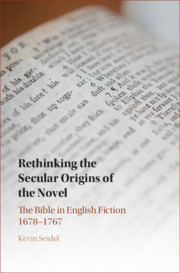Book contents
- Rethinking the Secular Origins of the Novel
- Rethinking the Secular Origins of the Novel
- Copyright page
- Contents
- Figures
- Tables
- Appendixes
- Acknowledgments
- Introduction
- Part I Rethinking the Secular at the Origins of the English Novel
- Part II Versions of Biblical Authority
- Part III Uses of Scripture for Fiction
- Chapter 6 Traveling Papers: Pilgrim’s Progress and the Book
- Chapter 7 Surprised by Providence: Robinson Crusoe as Defoe’s Theory of Fiction
- Chapter 8 Resilient to Narrative: Clarissa after Reading
- Chapter 9 Breaking Down Shame: Narrating Trauma and Repair in Tristram Shandy
- Conclusion
- Appendices
- Notes
- Works Cited
- Index
Chapter 8 - Resilient to Narrative: Clarissa after Reading
from Part III - Uses of Scripture for Fiction
Published online by Cambridge University Press: 16 March 2021
- Rethinking the Secular Origins of the Novel
- Rethinking the Secular Origins of the Novel
- Copyright page
- Contents
- Figures
- Tables
- Appendixes
- Acknowledgments
- Introduction
- Part I Rethinking the Secular at the Origins of the English Novel
- Part II Versions of Biblical Authority
- Part III Uses of Scripture for Fiction
- Chapter 6 Traveling Papers: Pilgrim’s Progress and the Book
- Chapter 7 Surprised by Providence: Robinson Crusoe as Defoe’s Theory of Fiction
- Chapter 8 Resilient to Narrative: Clarissa after Reading
- Chapter 9 Breaking Down Shame: Narrating Trauma and Repair in Tristram Shandy
- Conclusion
- Appendices
- Notes
- Works Cited
- Index
Summary
Chapter 8 focuses on a uniquely descriptive scene in Samuel Richardson’s Clarissa (1749) where the heroine is depicted under arrest, kneeling in silent prayer, with her finger enclosed in a Bible to mark where she had been reading. This chapter also briefly discusses book scenes in Richardson’s Pamela (1740), where the heroine is compared to the Book of Common Prayer. This chapter shows how Richardson uses the authority associated with devotional reading to hallow our imaginative, psychological descent into his fictional characters.
- Type
- Chapter
- Information
- Rethinking the Secular Origins of the NovelThe Bible in English Fiction 1678–1767, pp. 202 - 230Publisher: Cambridge University PressPrint publication year: 2021

